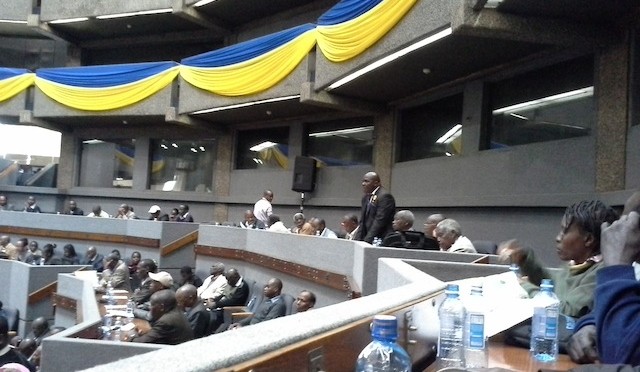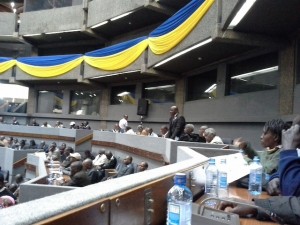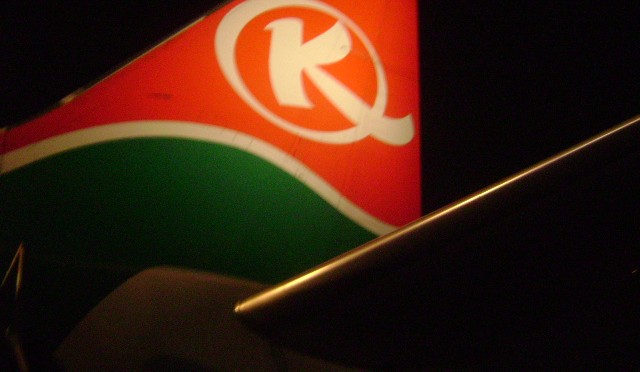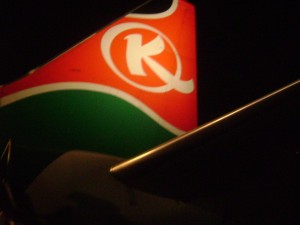Category Archives: AGM

Access Kenya EGM
This morning saw what was likely the very last shareholders meeting of Access Kenya, as a public company. The Company Secretary reported receiving 11,207 proxies representing 85% of the shareholders at the extraordinary general meeting (EGM) that was to vote on the de-listing of all the issued 218 million ordinary shares of the company form the Nairobi Securities Exchange following a buyout offer that the board of directors had already endorsed and which 75% of the shareholders had voted in favour of.
A few of the retail shareholders present asked lots of questions about the deal, and it seemed they were unhappy that just over five years after they bought shares in the company at an IPO, after which the share had risen to 38 shillings, before dropping to Kshs. 4, and getting low inconsistent dividends, in between, they were now being evicted from the company.
Some questions/topics raised:
 – Why sell out for Kshs 3 billion (~$35 million) that could easily have been raised locally? The Directors
– Why sell out for Kshs 3 billion (~$35 million) that could easily have been raised locally? The Directors
– Was there a capital markets (CMA) rule on the minimum number of years that a company had to remain listed after an IPO? The directors said there was none, and the regulators had approved all decisions taken by the directors in the deal
– Some shareholders said they had bought shares at about Kshs. 18, and were taking a big loss. Directors replied that Kestrel Capital, as an independent advisor, said Kshs. 14 was a good price to take and that Kshs 14 was a big improvement from the Kshs 4 low in the past year, and Kshs. 9 when the deal was announced and shares frozen.
– Were the needs of minority shareholders considered in the negotiations, and why didn’t the majority shareholders simply reduce their stakes, instead of selling the company outright?
– Why was the offer to retail shareholders structured as an ‘unconditional’, mandatory one? The directors said that no one was being forced out of the company and that any shareholders who wanted to remain could do so, and they will still receive annual audited accounts from Access Kenya..they noted that there were still some shareholders of Unilever Kenya which delisted in 2009
– What is the fate of employees who own shares in the ESO..and will they be arm-twisted to vote the shareholders’ acceptances past the 90% threshold? The directors said Dimension Data was a $6 billion company who’s parent was a $100 billion one with ambitious plans for Access Kenya and Eastern Africa.
The final results of the shareholders voted will be tabulated by Deloitte and released in two days – and payments should be made to shareholders in September 2013.
Unga 2012 AGM

Kenya Airways 2011 AGM
Having not been to an AGM in 2011, I decided to take an hourto peek at the Kenya Airways (KQ) one as a shareholder and for sentimental reasons, including the love of aviation, because a KQ AGM was the inspiration for this blog.
There’s not been much change over the years: KQ, which has over 70,000 shareholders, has been generous with SWAG to shareholders over the years and this has ensured that they always have some good attendance (they also provide free transport from town to the Bomas venue of the AGM) – however this also means that their meetings are long and drawn out, with lot’s of time wasting (Chami) and inane questions (@ChrisKaranja 90% of all questions are related to umbrellas and food)
Some notable points
Investments: Regarding their Precision Air investment, (It’s now in the middle of an IPO) a shareholder noted KQ which owns 49% of Precision, posted a loss of Kshs. 188 million for the year to March 2011 on their investment – and looking at the Precision March 2011 ones, their pre-tax Kshs. 250 million profit was halved by forex loan revaluation adjustment of Kshs. 125 million (so the current shareholders in Precision swallowed the loss before the IPO). On their dormant investments, the KQ Chairman said one of them would be revived soon (Probably Flamingo Air, or one of two cargo companies)
Dividend: The March 31 annual dividend will be paid on 16 November.
Board: Amb. Denis Afande was retiring as a director, but there were no fireworks as in previous years – as this time, the board has settled on his replacement. Amb Denis Awori, a former Kenya rugby official and ambassador to Japan, and currently Chairman of Toyota Kenya was introduced by the KQ Chairman. He spoke briefly on his passion for the airline; he studied aeronautical engineering, was a trainee at East African Airlines (EAA was the precursor to KQ) and as ambassador to Japan participated in promoting the airline as it featured heavily in tourism promotions that were run.
Rights Issue: The Chairman spoke about their need to acquire more aircraft and pay for them including 10 Embraer 190 aircraft. The airline settled with Boeing in April on the delayed 787 aircraft (some of which were to replace Boeing 767) and the first one that was expected in October 2010, will now arrive in fourth quarter of 2013 when they anticipate loads will have increased significantly.
KQ are getting permission from shareholders (and closing the books) so they could go to the Capital Markets authorities in Kenya (& Uganda & Tanzania) but they were yet to determine the size or price. One shareholder (Mr. Karanja) cautioned that it was potentially dilutive (4X), came at a bad time (share price is low – a market price of 26 compared to NAV of 50 per share) and that a convertible bond or cheap overseas loans were better options. (FC) Karanja agreed with this, adding that they had not yet set the date, price, and structure, except that the funding plan would be a mix of debt and equity and that the new shares would create capacity for when the board decided the time was right. The KQ Chairman noted that both the principal shareholders – the Government of Kenya and KLM supported the increase in capital and the rights issue.
Missing the 2011 AGM Season
May and June are the seasons for corporate annual general meetings (AGM), but I’m yet to attend any except from one for a savings & credit society (SACCO).
SACCO’s: are getting more recognition in acknowledgement of their significant deposit holdings and loan portfolios and now have a new regulatory agency to oversee the sector.
In a variation from corporate AGM’s, at a SACCO one members have to first approve the chairperson’s report, supervisory report, accounts and budget before discussions can be held. Also at SACCO AGM’s, the rules allow members on the floor to contribute to a much higher degree, but this also means time has to be spent clarifying (from the by-laws) on exactly what proposals from the floor can be entertained e.g. how much they can vary the amount that will be paid to the management committee (honoraria).
This year, there was much debate over the last starting time of the AGM and if those members who were late in arriving at the meeting were entitled to payment of an attendance lunch allowance of $25.
Other country perspectives:
Rwanda: In Kigali, Bralirwa held their first AGM – after the company had converted to a public company and had an IPO last year. No writing has come from that meeting, but it is likely to have been quite similar to a Kenyan AGM, seeing as how much Kenyans have contributed to the structure and regulation of the capital markets system in Rwanda.
Also
– Shareholders were expected to approve an increase in capital a few months after the IPO.
– The standard auditor’s statement page has an extra clause noting that we (KPMG) have no relationship, interest or debt with the Bralirwa, and …… we comply with ethical requirements (of the) International Federation of Accountants’ Code of Ethics for Professional Accountants, which includes comprehensive independence and other requirements..
India: The Economist wrote about the Reliance AGM – at Reliance company run by India’s richest man. It is remarkably similar to a couple of Kenyan ones – (and was) a ceremony for retail shareholders, with hero-worship of an international icon and family that transformed the company to an international conglomerate. It was interesting to note that shareholders apply to speak ahead of time and get approval.
USA: Noted investor and blogger Eric Jackson wrote on the Yahoo AGM . He noted (on AGM’s) that big shareholders stay home and it is mainly those who live nearby, that attend for the free food & coffee. Also that the Q&A is tame with short answers to questions, no big news expected, and the only exciting thing was going to be the board election.
He has been very critical of the board and the current CEO and wrote elsewhere in Forbes on his preferred nominees to be the next Yahoo CEO .
Others twitter comments;
– What a downer! $YHOO “@TechCrunch: Angry Yahoo Shareholder Confronts Bartz And Asks For Her Head (Audio Clip) tcrn.ch/l9hHYJ”
– Terry Semel was let go by the Yahoo board ONE week after it backed him at 2007 shareholder mtg. They now back Bartz.
– $YHOO consensus estimate is it will do $4.55b in 2011. By my estimates, Alibaba Group (incl Alibaba.com, Taobao & Alipay) will beat that
– Here is my first 21CBH article on Jack Ma: http://is.gd/PsTaz4 $YHOO
